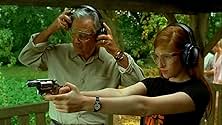Füge eine Handlung in deiner Sprache hinzuA psychoanalyst and consummate womanizer is brutally shot while his wife is standing over him with a revolver in her hand.A psychoanalyst and consummate womanizer is brutally shot while his wife is standing over him with a revolver in her hand.A psychoanalyst and consummate womanizer is brutally shot while his wife is standing over him with a revolver in her hand.
Fotos
Jim Adhi Limas
- Owen
- (as Jim-Adhi Limas)
Handlung
WUSSTEST DU SCHON:
- WissenswertesThe detective Hercule Poirot, the investigator in the original novel, is absent from the film.
- VerbindungenVersion of Kiken na onnatachi (1985)
Ausgewählte Rezension
The legal successors of Agatha Christie were known to be very strict with film producers. Their terms of reference indeed implied that the screen adaptations of Lady Agatha's mysteries were to be set exclusively within the four-decade period (1920's-1960's) in which she had been active and in the very places she had described (England most of the time of course). Then in 2000 or thereabouts they suddenly relented and started accepting adaptations that were less faithful to the letter provided of course they stuck to the spirit of the original work. As a result, the stories could be updated, the action relocated while the sacrosanct investigators (Hercule Poirot, Miss Marple,
) could be replaced by more anonymous though not necessarily less colorful local sleuths
Would Miss Christie's celebrated whodunits survive such a treatment?
It looks as though they do.
In France Pascal Thomas was the first to step into the breach (he made two adaptations, 'Mon petit doigt m'a dit' and 'L'heure zéro' and his currently shooting his third one). Now it is Pascal Bonitzer's turn to offer French viewers his own re-reading of 'The Hollow', first published in 1944, oddly retitled 'Le grand alibi' (a title previously used for the dubbed version of Hitchcok's 'Stage Fright').
The common point of the three films is that their plot has been transposed to contemporary France, that they are very faithful to the source novel (their plot twists have not been altered or very little) and that they play by the rules of the detective story genre, never outsmarting the writer and each time providing the viewer with a very satisfying mystery climax.
What distinguishes them is the tone adopted. While Thomas' two films have a quirky offbeat poetic humor Bonitzer slashes at his characters in a harsher, more down-to-earth way, notably through nasty, biting dialogs.
A senator (self-assured, no-nonsense Arditi), his conventional wife (hilariously goody-goody Miou-Miou), some of their relatives and their guests (womanizer Lambert Wilson, sex-bomb-with a brain Caterina Murino and others all played by very competent actors) are not left unscathed by Bonitzer (and Christie, it goes without saying)'s scalpel.
Anyway, whether adapted by Thomas or Bonitzer, evidence is that there is more to Agatha Christie's crime stories than just well constructed but hollow pulp fiction. What allows her writings to transcend time and borders is the characters she created, most of them hiding their vices behind the varnish of good manners. Finding the murderer is also unveiling the dark side of human nature. What is more universal?
Would Miss Christie's celebrated whodunits survive such a treatment?
It looks as though they do.
In France Pascal Thomas was the first to step into the breach (he made two adaptations, 'Mon petit doigt m'a dit' and 'L'heure zéro' and his currently shooting his third one). Now it is Pascal Bonitzer's turn to offer French viewers his own re-reading of 'The Hollow', first published in 1944, oddly retitled 'Le grand alibi' (a title previously used for the dubbed version of Hitchcok's 'Stage Fright').
The common point of the three films is that their plot has been transposed to contemporary France, that they are very faithful to the source novel (their plot twists have not been altered or very little) and that they play by the rules of the detective story genre, never outsmarting the writer and each time providing the viewer with a very satisfying mystery climax.
What distinguishes them is the tone adopted. While Thomas' two films have a quirky offbeat poetic humor Bonitzer slashes at his characters in a harsher, more down-to-earth way, notably through nasty, biting dialogs.
A senator (self-assured, no-nonsense Arditi), his conventional wife (hilariously goody-goody Miou-Miou), some of their relatives and their guests (womanizer Lambert Wilson, sex-bomb-with a brain Caterina Murino and others all played by very competent actors) are not left unscathed by Bonitzer (and Christie, it goes without saying)'s scalpel.
Anyway, whether adapted by Thomas or Bonitzer, evidence is that there is more to Agatha Christie's crime stories than just well constructed but hollow pulp fiction. What allows her writings to transcend time and borders is the characters she created, most of them hiding their vices behind the varnish of good manners. Finding the murderer is also unveiling the dark side of human nature. What is more universal?
- guy-bellinger
- 19. Juli 2008
- Permalink
Top-Auswahl
Melde dich zum Bewerten an und greife auf die Watchlist für personalisierte Empfehlungen zu.
Details
- Erscheinungsdatum
- Herkunftsland
- Offizielle Standorte
- Sprache
- Auch bekannt als
- The Great Alibi
- Drehorte
- Villiers-le-Bâcle, Essonne, Frankreich(manor, park and swimming pool)
- Produktionsfirmen
- Weitere beteiligte Unternehmen bei IMDbPro anzeigen
Box Office
- Weltweiter Bruttoertrag
- 3.959.804 $
Zu dieser Seite beitragen
Bearbeitung vorschlagen oder fehlenden Inhalt hinzufügen

Oberste Lücke
By what name was Le grand alibi (2008) officially released in Canada in English?
Antwort



























